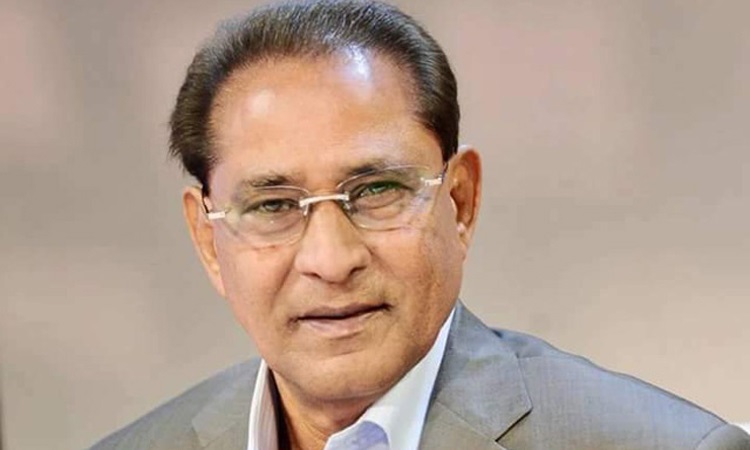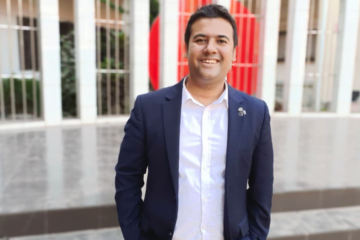Abdur Rahman
Sheikh Kamal, the eldest son of Father of the Nation Bangabandhu Sheikh Mujibur Rahman, was a unique organizer with multi-dimensional talents. Sheikh Kamal has established himself at an extraordinary height as a rare talented organizer and entrepreneur of Bengali culture and sports field in just 26 years of country and social thought. He was equally active in politics.
Today August 5 is his birthday. He was born on this day in 1949 in Tungipara of Gopalganj district. From a very young age, he had a great passion for sports. While studying at Shaheen School, Dhaka, he was an essential and integral part of every school sports event. Among them, the attraction towards cricket was the most.
He developed himself as a long-bodied effective fast bowler. But being a Bengali and a son of Mujib at the same time, undivided Pakistan has been woefully neglected at the national level of cricket. Azad joined Boys Club at a young age and played first division cricket for the club for a long time. Azad Boys Club of Dhaka was the breeding ground of talented young cricketers.
His interest in sports as well as cultural activities and the breadth of his activities reveal a vast side of his talent and mind. He has left the signature of his talent in all fields including acting, music practice, debates, present speeches.
He passed SSC from Shaheen School and got admission in Dhaka College. From there, he passed the HSC examination and was admitted to the Department of Sociology of Dhaka University. As a student of Salimullah Hall of the university, Sheikh Kamal was the captain of the hall's basketball team. Salimullah Hall excelled in basketball during his time due to his outstanding basketball skills.
Rabindra Sangeet became the language and weapon of his protest when the military junta government of Pakistan banned Rabindra Sangeet in 1969. At that time, Sheikh Kamal created an example of non-violent protest by singing Rabindra Sangeet in various movement situations. Besides organizing music artists, Rabindra also took the initiative to sing the song 'Amar Sonar Bangla Aami Tohme Sahib' by artist Zahidur Rahim in various meetings and gatherings.
After admission to Dhaka University, his scope of work naturally expanded and became very extensive. He developed a reputation as a good actor in the university theater. He is one of the founders of theater organization Dhaka Theatre. He also toured India with his plays.
He staged Munir Chowdhury's famous drama Qabar on the stage of Kolkata. Acting talent has also signed on the Bangla Academy stage. He was very fond of playing the sitar. Sheikh Kamal was a student of Chayanot's sitar department. He used to take classical music lessons from Ustad Ful Mohammad at his home.
He founded Abahani Krirachakra, one of the most powerful and popular clubs in the country, with the aim of promoting sports and promoting sports. In this context, his elder sister Bangabandhu's Honorable Prime Minister Sheikh Hasina said, 'There was no sports facility in the Dhanmondi area. He (Sheikh Kamal) took the initiative and built Abahani with everyone in the region. Strengthens Abahani even after the liberation war.'
Abahani Krirachakra gave birth to a revolutionary revolution in the sports field of Bangladesh. He was able to push Abahani to the high seat of glory, overtaking the established and popular club Mohammedan. Gradually, he became active in the formation of Abahani branches all over the country.
He has always emphasized the need for sports and cultural awakening to ensure the youth community's spirit is cheerful and not led astray. And in his long life of only 26 years, he is seen taking various initiatives accordingly. He formed the 'Spandan Shiligruna' with his friends, artists and colleagues.
In mixing with friends and colleagues, none of him ever showed any signs of arrogance. Budhuvatsal Sheikh Kamal was very simple in life. Despite being the architect of the country and the son of the Prime Minister, he did not abuse any power.
Sheikh Kamal's living room on the third floor of Dhanmondi number 32 used to have a variety of musical instruments. It would not be difficult for anyone to guess what kind of person he was in taste and mentality, who started his day with music, piano and sitar, then finished football and cricket matches and was busy in the evening on the stage of drama or in rehearsals.
Apart from these things, Sheikh Kamal also took the lessons of politics from his family environment. He created himself in the spirit of Bengali nationalism as a result of witnessing the consistent and uncompromising struggle of his father Bangabandhu Sheikh Mujibur Rahman in the struggle for Bengali rights.
Sheikh Kamal was also born in 1949, the year of the birth of Awami League. The continuity of Awami League's path, which can be understood only by reviewing the life of Bangabandhu, its influence has naturally become closely associated with the life of Sheikh Kamal.
Hon'ble Prime Minister Sheikh Hasina wrote in one place in her memoir titled 'Sheikh Mujib Amar Pita'- “Kamal learned to speak little then. But he has never seen or known his father. As I repeatedly run to Abba, calling Abba Abba, he looks on in amazement.
There is a large pond in Gopalganj police station, next to which there is a large open field. In that field we two siblings used to play and run to catch grasshoppers. And sometimes I ran to my father.
I have collected many flowers and leaves and sat playing with Kamal on the balcony of the police station. He suddenly asked me, 'Smile, father, should I call your father a little father?' When I remember Kamal's words today, I can't hold back my tears." Bangabandhu's sons and daughters had to grow up through such a struggle. The long struggle for freedom under the leadership of Bangabandhu has directly affected the Bengali family. The life of Sheikh Kamal, who grew up witnessing the struggle life of his father Sheikh Mujibur Rahman in jail and oppression, was also the initiation of his life to always be responsible towards people and society and play a role in various ways.
As an activist and organizer of the Chhatra League, he participated in the 6-point, 11-point movement and the mass uprising of '69. Possessing outstanding organizational skills, Sheikh Kamal directly participated in the liberation war. After being trained in the first war course of independent Bangladesh, he was commissioned in the Liberation Army and served as the ADC of General MAG Osmani, the chief commander of the Liberation War.
He was a member of the Central Executive Council of Bangladesh Chhatra League. When he was killed in the demonic attack of the conspirators on August 15, 1975, he was a student of MA in Sociology of Dhaka University. Just one month before that, on July 14, 1975, he married the best athlete Sultana Khuku, who received the blue title of Dhaka University, into his family.
If Bangabandhu and his family had not been killed in the morning of August 15 in the most scandalous and barbaric murder in Bengali history, Bangladesh would have got this multi-talented organizer and leader. By applying his talent and taste, we can find the path that he wanted to show the young generation the path of beauty and potential. My sincere regards to Sheikh Kamal on his 73rd birthday.
Author: Member of the Presidium, Bangladesh Awami League
Test News




